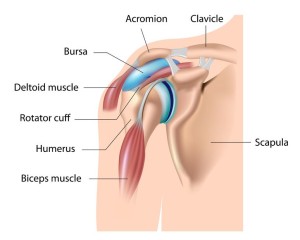 Impingement syndrome symptoms are very common. In fact, these symptoms are perhaps the most common shoulder symptoms that bring patients to the doctor. This is likely because almost any shoulder problem, including isolated impingement syndrome, can have these same symptoms. Often, however, these symptoms occur alone. Either way, the impingement syndrome symptoms are frequently the same.
Impingement syndrome symptoms are very common. In fact, these symptoms are perhaps the most common shoulder symptoms that bring patients to the doctor. This is likely because almost any shoulder problem, including isolated impingement syndrome, can have these same symptoms. Often, however, these symptoms occur alone. Either way, the impingement syndrome symptoms are frequently the same.
As you may recall from an earlier post, impingement syndrome describes painful degeneration (tendinosis) of our rotator cuff tendons and inflammation of the normally occurring, thin sac (bursa) that sits between the rotator cuff and the bone on the top of the shoulder, the acromion. As the tendon degenerates and the overlying sac becomes inflamed, they thicken. This thickening then makes these structures even more likely to get pinched. This leads to further injury, inflammation…and further pain.
This process often occurs along with some dysfunction of the shoulder. Usually this is a loss of motion. The primary motion affected is a reduction in the ability to put your arm behind your back.
Impingement syndrome is one of the most common causes of shoulder pain. Fortunately, when properly diagnosed, it is usually easily treated.
So what are the common symptoms?
Common Impingement Syndrome Symptoms
- Pain on the side of the upper arm
- Pain with overhead activities
- Nighttime pain
- Loss of shoulder motion (primarily the motion required to reach behind your back)
Other Symptoms
- Pain in the front or back of the shoulder
- Popping, grinding or a catching sensation with shoulder motion
- Weakness
As you can see, pain is the predominant symptom. Unfortunately, this is a very nonspecific finding and can be found with almost any shoulder problem. That is why it takes a well-trained shoulder specialist to properly diagnose and treat your problem.
So, if you are suffering from any of the symptoms listed above, it is probably a good time to get your shoulder evaluated :-( .
